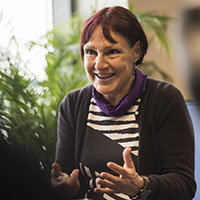Computer scientists from the University of Southampton will support key developments of global scale decentralised systems as part of a new EU Blockchain Observatory and Forum launched by the European Commission.
Experts from Southamptonâs Department of Electronics and Computer Science (ECS) will work with European research groups and industry partners to shape blockchain technologies that will impact digital services across different sectors, e.g. in the healthcare, finance and government services.
Blockchain technologies bring about high levels of traceability and security in online transactions by storing blocks of information that are distributed across a network. The new EU Blockchain Observatory and Forum will help Europe seize new opportunities offered by this technology by building expertise and leadership in the field.
Professor Elena Simperl and Research Fellow Dr Luis-Daniel Ibáñez from ECSâs Web and Internet Science research group will publish findings from recent research and innovation activities as part of Southamptonâs contribution to the international consortium.
âThe EU Blockchain Observatory is one of the first projects of this kind to be supported at a European level and will provide a comprehensive, holistic overview to a field that has been advancing at great pace,â? Elena explains. âThe University of Southampton brings in unique expertise in studies and methods to blockchain technologies which will have profound socio-technical impacts in the near future. Our work in this project will result in white papers on specialist subjects that inform thought leadership frameworks and policies in the blockchain space. In particular, we will be promoting our recent activities around interoperable distributed ledgers and their applications in creative industries, government and science, drawing upon principles that have already made the Web so successful.â?
The EU Blockchain Observatory and Forum was launched last month February and continues the European Unionâs rich investment in the field. By 2020, up to â¬340 million in projects could be funded through the EUâs FP7 and Horizon 2020 research programmes that could draw upon blockchain technologies.
Andrus Ansip, European Commission Vice-President for the Digital Single Market, says, âTechnologies like blockchain can help reduce costs while increasing trust, traceability and security. They have huge potential for making social and economic transactions more secure online by guarding against an attack and removing the need for any middleman. We want to build on Europe's substantial talent base and excellent startups to become a leading world region that will develop and invest in the rollout of blockchain.â?



